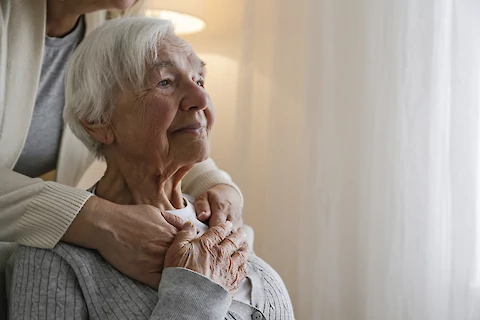
Understanding Alzheimer's Disease is crucial for anyone caring for seniors affected by this condition. This blog post defines Alzheimer's Disease, explores its symptoms, and explains the stages, causes, and risk factors. We also discuss the strategies that may delay the progression of the disease, help manage daily life tasks, and address the behavioral changes that come with Alzheimer's. Additionally, this article reviews the importance of medical consultations and support groups for caregivers and their loved ones.
Understanding Alzheimer's Disease in Seniors
Alzheimer's Disease is a progressive neurological disorder that causes problems with memory, thinking, and behavior problems. Symptoms usually develop slowly and worsen over time, often becoming severe enough to interfere with everyday tasks. Some common signs include forgetfulness, confusion, difficulty completing familiar tasks, as well as changes in mood or personality. Alzheimer's progresses in stages, moving from mild to moderate to severe over time.
While the exact cause of Alzheimer's remains unknown, experts surmise it may involve a combination of genetic, environmental, and lifestyle factors. Some significant risk factors also include age, family history, and specific genetic mutations.
Though early-onset Alzheimer's Disease may start as early as the forties, seniors make up the vast majority of Alzheimer's patients. Approximately 6.7 million Americans over the age of 65 suffer from the disease. Most of those people, or about 73%, are 75 or older. Two-thirds of Alzheimer's patients in the US are women.
Coping Strategies for Alzheimer's Disease
While no cure currently exists for Alzheimer's Disease, some strategies may help seniors manage its symptoms and delay its progression. Regular mental and physical exercise, a heart-healthy diet, social engagement, and managing risk factors for cardiovascular diseases all contribute to preserving brain health.
Additionally, caregivers should prepare for the behavioral changes associated with Alzheimer's. These changes could range from anxiety and aggression to sleep disturbances and depression. Patience, flexibility, and good communication will significantly help manage these changes.
It's also essential to establish coping mechanisms for seniors living with Alzheimer's Disease and their caregivers. These coping strategies might involve creating a safe and supportive living environment, simplifying tasks, and supporting seniors' sense of independence and control. For the caregiver, this might mean taking self-care seriously, seeking help, and managing stress.
Importance of Medical Consultations and Support Groups
Regular medical consultations are vital to managing Alzheimer's. Regular consultations allow doctors to monitor seniors' condition, adjust treatments as needed, and provide valuable advice to caregivers.
Support groups offer a platform for caregivers to share their experiences, learn from others in similar situations, and reduce feelings of isolation. These groups benefit emotional well-being and provide practical advice. Other resources like online forums, helplines, and Alzheimer's disease resource centers offer valuable support.
We Can Help
Understanding Alzheimer's Disease in seniors and possessing the right tools and resources will significantly impact the caregiving journey.
If you seek professional assistance with Alzheimer's care in Huntsville, Madison, Meridianville, New Market, or Brownsboro, don't hesitate to contact us at Senior Helpers Huntsville. We would love to talk to you about our services for seniors and caregivers, such as Alzheimer's and Dementia Care and Respite Care.